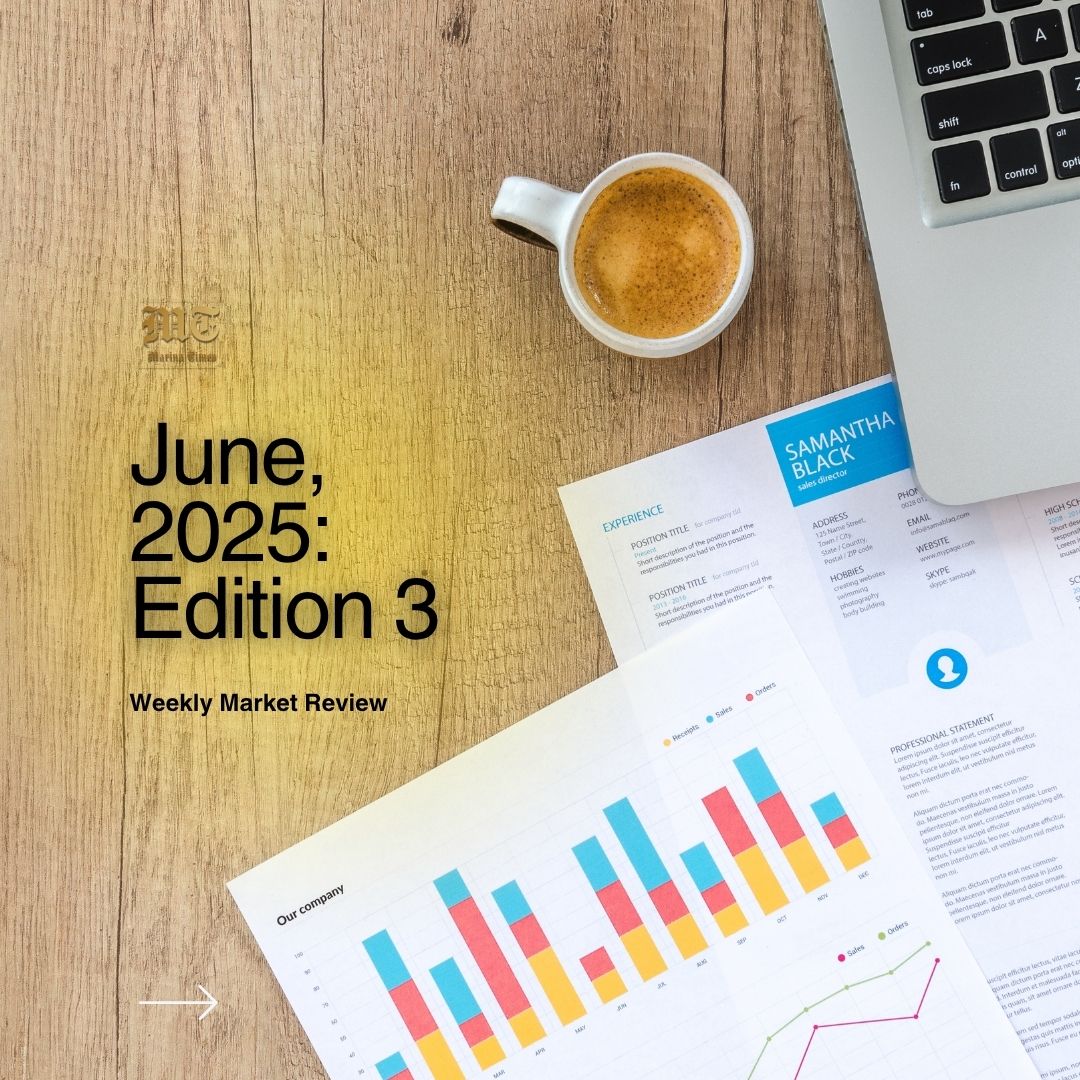

Markets entered June without fresh activity from the primary auction space, yet the week was anything but quiet. The Central Bank of Nigeria (CBN) drew a firm line under the recapitalization of Bureau De Change (BDC) operators, refusing to budge on the June 3 deadline. This signals a tighter regulatory regime as the bank presses forward with reforms to stabilize the FX market.
Globally, geopolitical tensions in the Middle East ignited a rally in oil prices following Israel’s airstrike on Iran. Brent surged above $74 per barrel while WTI hovered around $73. These price levels have pushed Nigeria close to its budget benchmark. But such price spikes, while fiscally favourable, often carry the sting of domestic inflation and higher operating costs.
In Nigeria, the Federal Government intensified its appeal to impact investors as it outlined a transformation agenda targeting agriculture, infrastructure, and digital sectors, anchored on an ambitious 7% GDP growth goal.
Meanwhile, liquidity conditions improved markedly, and the Naira danced within a volatile band, reflecting both relief and caution in the financial system. As we head into the week, markets are bracing for inflation numbers that could shape the near-term direction of yields and investor confidence.
The secondary market for bonds has remained lively, with sustained demand for the 2031 and 2033 FGN bonds. A mild bullish rally followed the Sallah holidays, with yields facing resistance around 19.20% for both tenors.
This buying momentum appears to be driven by investors positioning ahead of the upcoming June bond auction by the Debt Management Office (DMO), where supply is expected to remain tight.
The DMO has announced its plans to complete its Q2 borrowing calendar with the introduction of two new bonds (a 5-year and 7-year bond). With this being the final issuance for the second quarter, investors are eager to lock in current yields before the rates potentially compress further.
However, the market behaviour reflects a few key dynamics. On one hand, there is an expectation that the DMO may continue to manage supply tightly to moderate borrowing costs. On the other hand, demand for mid- to long-tenor instruments remains strong, particularly among pension funds and asset managers seeking yield stability. Additionally, investors may seek positions ahead of potential macroeconomic data releases, including inflation reports and monetary policy shifts that could influence future yield levels.
Overall, the current tone of the market shows a strong secondary market appetite in the face of limited supply and a more conservative approach towards the outcome of the June auction.
With the recapitalization deadline for Bureau De Change (BDC) operators now reached, the Central Bank of Nigeria (CBN) has dispelled speculations about an extension. The Acting Director of Corporate Communications, Hakama Sidi Ali, described the information as false and misleading, stating that it should be disregarded, affirming that the final deadline of the exercise remains June 3 not the speculated December 31.
Under the revised framework introduced in February 2024, BDCs were required to meet new minimum capital requirements: ₦2 billion for Tier-1 and ₦500 million for Tier-2 operators. This recapitalization initiative carries significant implications for Nigeria’s financial markets, particularly the foreign exchange (FX) market and fixed income space.
In the FX market, this move represents a calculated attempt to restore order and credibility to a segment often accused of fueling volatility. By mandating a higher capital base, the CBN has effectively pushed undercapitalized BDCs out of operation, narrowing the access points for individuals and small businesses seeking foreign currency, particularly those reliant on the parallel market. With fewer players and tighter regulatory oversight, the BDC segment is expected to become more formalized, efficient, and better aligned with the official FX policy. Over time, this could help reduce the gap between the official and parallel market rates and alleviate speculative activities that typically undermine FX stability.
However, the transition is unlikely to be smooth. In the short term, this could result in reduced FX liquidity at the retail level, pushing more demand towards informal markets and probably increase pressure on the Naira. A narrower pool of compliant BDCs means a temporary contraction in supply, which could result in an uptick in street rates, especially where the CBN does not actively support liquidity.
According to a report by Reuters, Nigeria and the Saudi Arabian oil company Aramco have been unable to reach an agreement on a $5 billion oil-backed loan. Sources claim that the delay stemmed from a persistent decline in crude prices, which heightened concerns among participating banks backing the deal.
The recent jump in global oil prices, largely driven by rising tensions in the Middle East tensions could shift the tide. With Brent crude above $74 per barrel, and WTI close to $73, the outlook for Nigeria’s stalled $5 billion oil-backed loan talks with Saudi Aramco appears more favourable. Higher prices may restore lender confidence by improving Nigeria’s repayment capacity and assuring Aramco of stable collateral value.
Initially, the decline in oil prices triggered by OPEC+’s shift in focus from controlling prices to gaining back market share had put the brakes on the proposed facility. The $5 billion loan, which would be the largest of its kind in Nigeria’s history, is part of President Tinubu’s wider plan to raise $21.5 billion in foreign borrowing. The goal is to support the federal budget and ease pressure on the country’s external reserves. However, as crude prices dropped, lenders became hesitant, and the negotiations lost momentum.
Yet, with prices now rebounding, Nigeria finds itself in a stronger position to capitalize on crude sales, improve reserves, and potentially revive the $5 billion loan deal, set to be the country’s largest ever.
If renewed discussions succeed, the loan would support the federal budget and relieve pressure on external reserves. While optimism is rising, it is hoped that the market will wait on action and not act on speculation.
Last week, the Nigerian Exchange (NGX) saw a positive move, with equities gaining approximately ₦405 billion in value. The NGX All-Share Index climbed by 0.56% to close at 114,659.11 points, pushing the total market capitalization to ₦72.3 trillion on Wednesday. The rise reflected renewed investor interest, particularly in large-cap stocks.
Strong buying activity was seen in Dangote Cement, which rose by 4.50%, MTN Nigeria with a 3.23% gain, and Oando, which advanced by 6.32%. Other notable performers included Jaiz Bank, FCMB, and Access Holdings.
Despite the gains, overall trading activity declined. The total volume of shares exchanged fell by nearly 28% to 471.15 million units, while the sum transaction value dropped by about 25% to ₦14.19 billion across 20,538 deals. FCMB led the volume chart, while Seplat topped the value traded list.
In the second week of June, WTI and Brent crude opened at $64.30 and $66.20 per barrel, respectively, having traded within tight ranges since the beginning of Q2. While renewed optimism about crude demand followed trade talks between the U.S. and China, a sharper-than-expected decline in U.S. crude inventories sparked a market rally, further intensified by rising geopolitical tensions between Israel and Iran.
On June 13, 2025, Israel launched Operation ‘Rising Lion,’ targeting senior military personnel, air defense systems, and nuclear facilities across at least 12 Iranian provinces, including the capital, Tehran. In response, WTI and Brent surged to intraday highs of $76.97 and $78.03, before moderating by the close of trading on Friday to $72.98 and $74.23, respectively.
Given the multiple retaliatory strikes by Iran and its allied factions across other regions, including Gaza, the likelihood of further conflict escalation remains high. The most critical factors for oil markets at this stage are Iran’s crude oil exports and its strategic control of the Strait of Hormuz.
Should tensions persist or intensify, we anticipate oil prices may climb significantly, potentially breaching their 12-month highs of $84.10 for WTI and $87.76 for Brent.
The market is in an anticipatory mood as the May 2025 inflation report is expected this week, particularly following the slight moderation observed in April’s rate easing to 23.71% from 24.23% in March. This deceleration offered a bit of relief after months of sustained price pressures. However, whether this trend holds or reverses will be crucial, amid ongoing structural and external pressures.
Nigeria’s inflation trajectory does not exist in a vacuum with regards to the global context. According to the World Bank’s latest Global Economic Prospects report, global growth is projected to slow to 2.3% in 2025, a downward revision of nearly 50 basis points from earlier estimates. This would mark the weakest rate of non-recessionary global expansion since the 2008 financial crisis. Contributing factors include intensifying trade tensions, geopolitical fragmentation, and lingering monetary policy uncertainty across advanced and emerging economies.
Meanwhile, despite oil’s price sharp movements, the cryptocurrency market appears to be charting its own course. Bitcoin continues to trade just above $104,000, while Ethereum lingers in the $2,500 range. This divergence suggests crypto may be moving independently of traditional commodities, hinting at a shift in investor behaviour.
Quotes
The Talks
Maybe the talks will start again…
Crude oil price is on the increase; Nigeria won't be cup in hand begging and fretting about the loan.
Aramco might have a rethink; discussions will be revisited.
Will it get signed or is it another waste of time?
Can they trust the market although it's volatile.
Will they give us a chance?
$5 billion can go a long way; boost our economy or loot our economy.
Time will tell.
By: Sandra A. Aghaizu